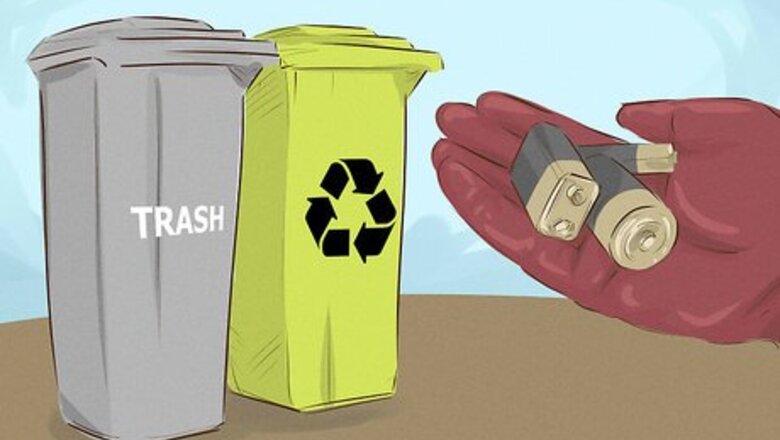
views
Disposing of Different Types of Batteries
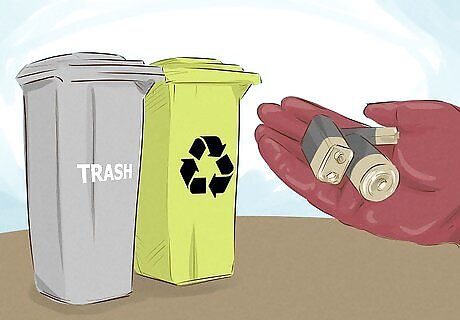
Throw away or recycle alkaline batteries. Alkaline batteries are the type that power most simple battery-operated devices, such as flashlights, toys, remote controls, or smoke alarms. They come in a variety of sizes, ranging from AAA to 9 volt. Proper disposal methods for alkaline batteries may depend on your local waste regulations. Most alkaline batteries manufactured since 1996 are made of relatively non-hazardous materials, and can be tossed directly into the trash. However, some states or municipalities still require that alkaline batteries be treated as hazardous waste. In these cases, the batteries must be recycled or dropped off at a designated facility. You may be able to drop off alkaline batteries for recycling at a local electronics retailer, recycling center, or community center. Check the Earth911 website for drop-off locations in your area.
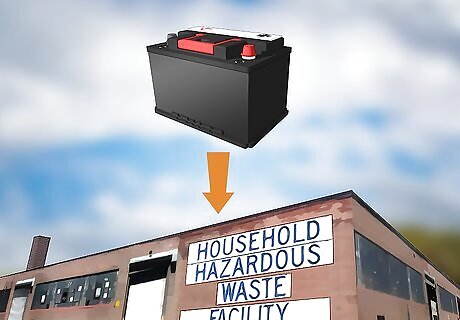
Dispose of car batteries at an auto parts retailer or hazardous waste collection site. Since car batteries contain lead acid, they can't be disposed of in the trash or tossed in with your recycling. Many retailers, like Home Depot or Auto Zone, will accept dead or used car batteries. You can also drop them off at recycling or waste disposal facilities that specialize in hazardous materials.
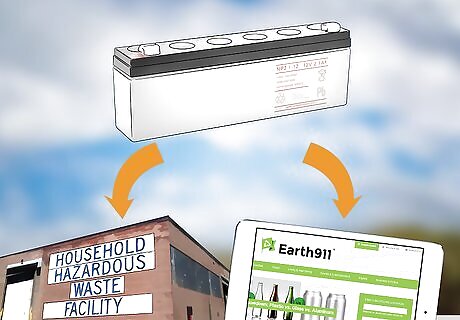
Take rechargeable batteries to a recycling facility. Rechargeable batteries contain nickel and cadmium, which can create an environmental hazard if the batteries are thrown away in a landfill or an incinerator. These batteries must be disposed of at a hazardous waste collection site, recycling facility, or an electronics retailer that recycles batteries. Many electronics retailers, like Radio Shack or Staples, will accept used rechargeable batteries for recycling. Check Earth911.com for participating retailers in your area.
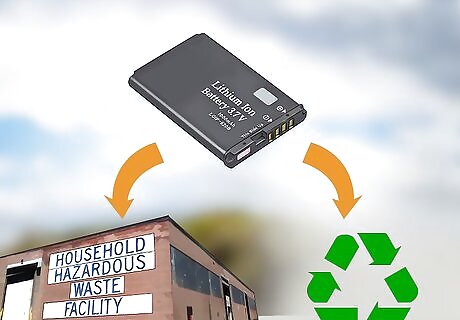
Donate or recycle lithium-ion batteries. These are the kinds of batteries that typically power portable electronics like your mobile phone, digital camera, tablet, or laptop. Lithium-ion batteries can be recycled at a recycling center or hazardous waste collection site, or donated to refurbishers and recyclers. In the USA, some retailers participate in a program called the Sustainable Materials Management Electronics Challenge. The SSM program encourages companies to recycle and refurbish lithium batteries and other electronic components. Check the EPA website for a list of participating businesses, here: https://www.epa.gov/recycle/electronics-donation-and-recycling Check with electronics retailers in your area to find out if they will accept donations of lithium-ion batteries.
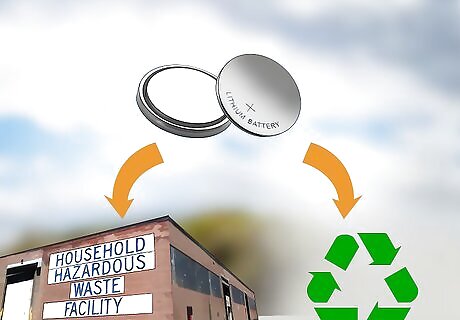
Dispose of button batteries at a hazardous waste collection site or recycling facility. This kind of battery is used in hearing aids and watches, and contains mercuric oxide, lithium, silver oxide, or zinc-air. They are considered hazardous materials and must be brought to a household hazardous waste collection site for proper handling. Button batteries contain extremely toxic materials, and should never be disposed of in the trash. You may be able to recycle or dispose of button batteries at some electronics retailers.
Learning Local Battery Disposal Regulations
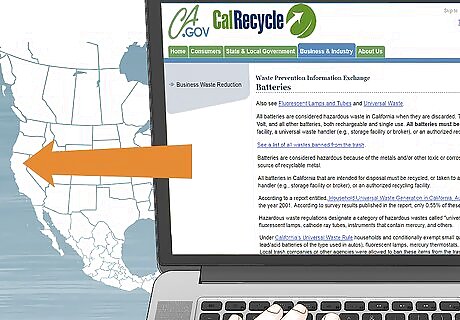
Check your local government website for battery disposal guidelines. The correct procedure for disposing of different types of batteries may vary significantly by region. Check the website for your state, city, or municipality for information on how to dispose of batteries in your area. For example: If you are in the UK, begin by looking at gov.uk's hazardous waste disposal page, which can help you find battery disposal facilities in your area: https://www.gov.uk/hazardous-waste-disposal If you are in the US, your state government's website probably has information on battery disposal. For example, if you live in California, you can find detailed information on battery recycling and disposal here: https://www.calrecycle.ca.gov/reducewaste/Batteries/
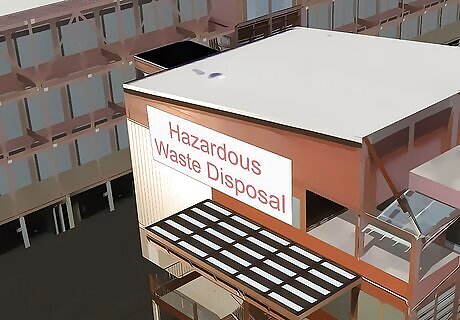
Find recycling facilities in your region. Once you have information on your local laws regarding battery disposal, you will need to find appropriate hazardous waste disposal or recycling facilities in your area. Some areas also offer home hazardous waste collection programs or regularly scheduled events in which you take your batteries to a designated collection site. In the US, you can use the Earth911 website to search for battery recycling or disposal locations in your area.
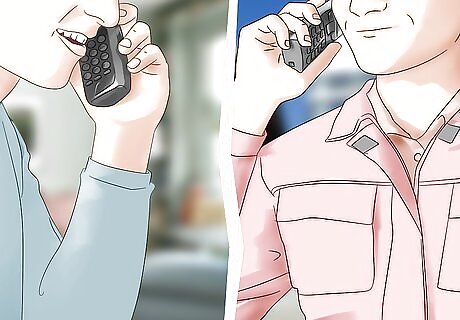
Contact your local library or community center. In the US and UK, many libraries offer battery recycling drop-off sites. Some community centers or city halls may also accept batteries for recycling.
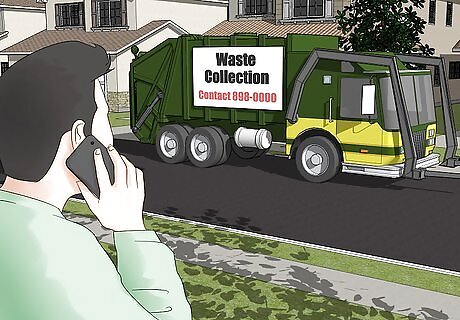
Call your waste collection service. The company that collects garbage or recycling from your home or workplace may offer hazardous waste disposal services. Even if they cannot collect your batteries, they may have a disposal site where you can drop off your batteries and other hazardous waste materials.
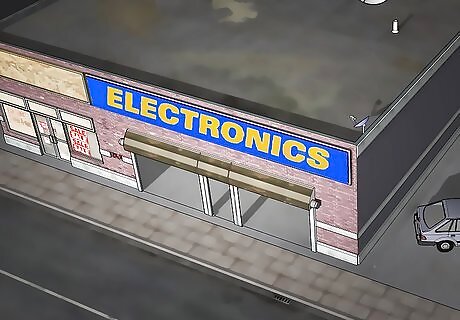
Check with local electronics or hardware retailers. Many businesses will accept batteries for recycling or disposal. In many cases, you can simply return your batteries to the store where you originally purchased them. If you aren't sure if a store will accept your batteries, call ahead. If the store does not accept used batteries, they may be able to suggest an alternative.
Storing Dead Batteries before Disposal
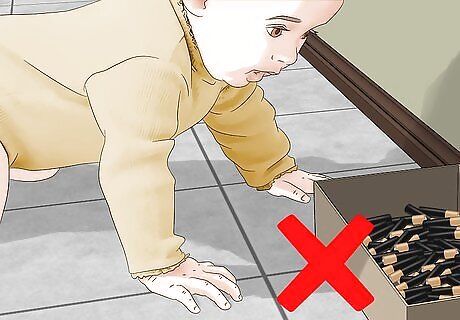
Store your dead batteries away from children and pets. Many types of batteries contain hazardous materials, such as mercury, lead, or acid. While you are waiting to dispose of your batteries, keep them in a place where they will not be accessible to children or pets who might be harmed by playing with them or swallowing them. If you do suspect that a child or pet has swallowed a battery, contact emergency services immediately.
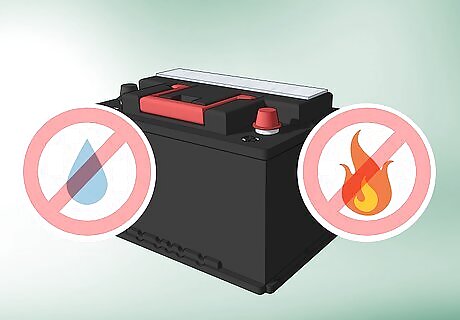
Keep your batteries in a cool, dry place. If your batteries become corroded or overheated, they could leak or rupture. It is also important to avoid storing your batteries near any flammable materials, as this could present a fire hazard.
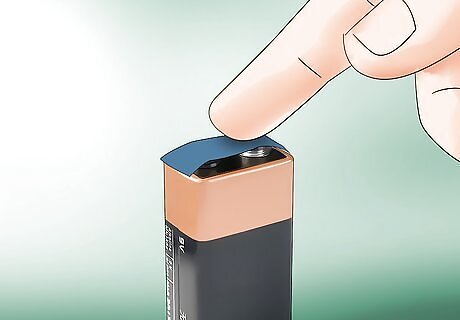
Tape the terminals of your batteries. Sometimes seemingly dead batteries still carry a bit of a charge. If the positive and negative terminals of old batteries touch, it can create an electric current, which can lead to a fire. This risk can be minimized by putting a little tape over the terminals of your old batteries until you are ready to dispose of them. Fire can also result from the terminals of batteries coming into contact with conductive materials (like keys, steel wool, or other objects likely to be lying in your rummage drawer).
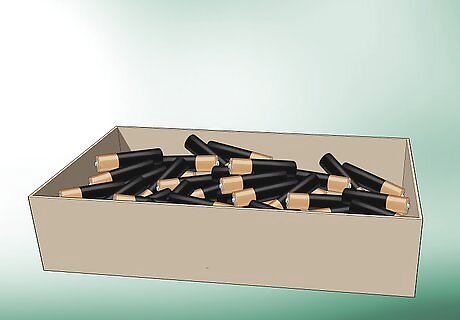
Store used batteries in a cardboard or plastic container. Storing your batteries in a non-conductive container will reduce the risk of fire, leakage, or rupture. If you still have the original packaging for your batteries, this is a relatively safe way to store old batteries for disposal. Consider individually bagging especially hazardous batteries, like 9 volt alkaline batteries, button batteries, lead acid batteries, or lithium batteries.
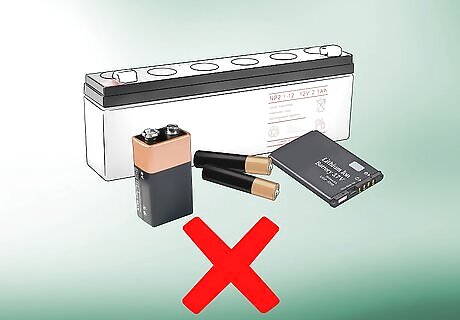
Do not store different types of batteries together. Mixing batteries with different chemistries may result in leakage and hazardous chemical reactions. If you have multiple types of batteries to dispose of, bag them separately.




















Comments
0 comment